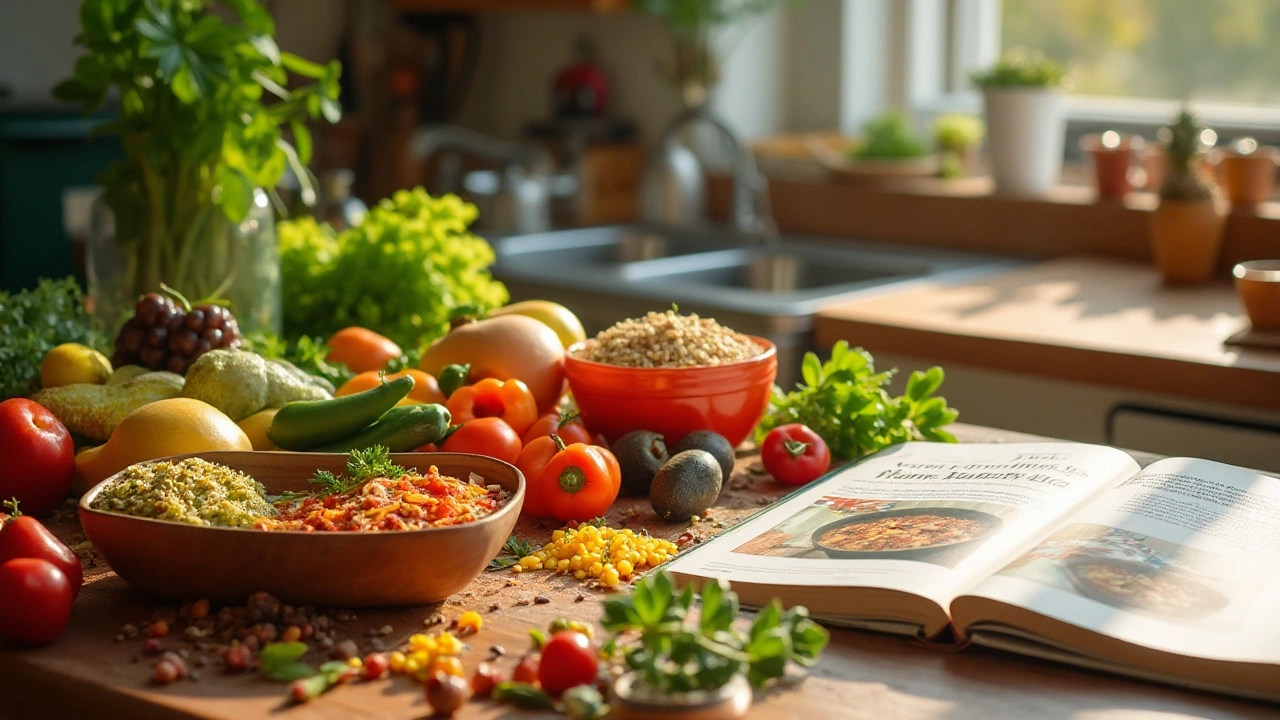Embracing a plant-based diet can be an exciting journey, inviting a host of new flavors and foods into your life. Yet, while many sing praises of its benefits, like improved health and environmental impact, the road is not entirely bump-free.
Potential downsides like nutritional gaps and other hurdles can act as obstacles if not properly managed. This needs careful planning and attention, particularly if the transition doesn't come naturally for everyone.
Here, we'll explore some of the common challenges associated with a plant-based diet. By understanding these hurdles—from nutritional pitfalls to social dynamics—we can better navigate a path toward a healthier, more sustainable way of living.
- Nutritional Gaps
- Limited Food Choices
- Increased Preparation Time
- Social and Cultural Challenges
- Cost Concerns
- Solutions and Tips
Nutritional Gaps
When diving into the world of a plant-based diet, one of the first challenges that may arise is ensuring a balanced nutritional intake. While plants are rich in vitamins, minerals, and fibers, they don't always provide all the essential nutrients that the human body requires. Particularly, this type of diet can fall short in delivering adequate amounts of vitamin B12, iron, calcium, omega-3 fatty acids, and sometimes protein. These nutrients play crucial roles in maintaining energy levels, supporting brain function, and ensuring bone health.
If these nutritional gaps aren't addressed, they can lead to health issues over time. For instance, vitamin B12, found predominantly in animal products, is essential for nerve function and the production of DNA and red blood cells. Deficiency in this vitamin can cause fatigue, neurological issues, and even anemia.
"The only reliable vegan sources of B12 are foods fortified with B12 (such as some plant milks, soy products, and breakfast cereals) and B12 supplements," notes the Vegan Society.Iron is another concern, as plant-based iron, known as non-heme iron, is less easily absorbed by the body compared to heme iron from animal sources, often necessitating careful dietary planning or supplementation.
On top of these, calcium and vitamin D, vital for bone strength, are typically found in dairy, which isn't consumed in a strict vegan diet. Though some leafy greens contain calcium, they also possess oxalates that can hinder absorption. So, it's beneficial to incorporate fortified plant milk or juices. Omega-3 fatty acids, important for heart and brain health, are mostly associated with fish, though they can be sourced from flaxseeds, walnuts, and algae-based supplements.
Table showing common nutrient sources and possible plant-based alternatives:
| Nutrient | Common Sources | Plant-Based Alternatives |
|---|---|---|
| Vitamin B12 | Meat, dairy | Fortified cereals, supplements |
| Iron | Meat, poultry | Spinach, lentils, tofu |
| Calcium | Milk, cheese | Fortified plant milks, kale |
| Omega-3 | Fish | Chia seeds, flaxseeds, algae oil |
Monitoring your nutrient intake on a plant-based regimen is crucial, meaning regular blood tests and consultations with a nutritionist or healthcare provider can be helpful. Adjusting your diet to include fortified foods and supplements, or possibly experimenting with different plant-based options like fermented foods, can balance these nutritional gaps effectively. With the right knowledge and tools, maintaining robust health while reaping the benefits of a plant-focused diet is indeed possible.
Limited Food Choices
One of the common hurdles that those on a plant-based diet often talk about is the sense of limited food choices. While it might seem that embracing such a diet opens the doors to an entire garden of possibilities, the reality can be quite different depending on your location and lifestyle. Unlike omnivores, people who focus strictly on plants must often get creative with their cooking to ensure variety and nutritional balance. It can be challenging, especially if you’ve grown accustomed to the vast selections that include animal products. Nonetheless, with time and a little ingenuity, many find ways to enjoy meals just as diverse and satisfying.
It's not unusual to feel restricted at first, especially when dining out. Many restaurants are still catching up with the growing vegan trend. Even in a cosmopolitan place like Melbourne, some menus lag behind, offering only token vegetarian items. For those new to this way of eating, it may require a shift in meal planning and sometimes having a backup plan if options are too limited—like carrying emergency snacks or identifying vegan-friendly spots ahead of time.
Prepackaged vegan foods and substitutes are gaining steam, but they can be pricey and often contain additives not present in their simpler counterparts.
"In reality, food limitation comes down to imagination and adaptation. The issue isn't variety per se but accessibility and familiarity," remarks Dr. Jane Goodall, a noted advocate for sustainable eating.To combat this, a visit to local farmers' markets might prove helpful, offering both inspiration and seasonal produce not typically found in supermarkets. Discovering this hidden diversity can transform the perception of limitation into a new culinary adventure.
An intriguing way to explore this is by focusing on seasonal produce. Utilizing fruits and vegetables at their peak not only enhances flavor but also supports local agriculture. It might involve learning new recipes or revisiting old family favorites with a twist. Online communities and recipe-sharing platforms offer a wealth of ideas to invigorate your palate with colors, textures, and tastes you may not have considered. This growing network of cuisine solidarity is slowly breaking down the idea of limited choices, one meal at a time.
One should also note the expansion of international influences as more global vegan recipes find their way into everyday cooking. Be it the umami-rich delights of East Asian tofu dishes or the hearty legumes of Middle-Eastern mezze, drawing inspiration from across the globe widens horizons significantly. It's a culinary opportunity to enrich one's diet without feeling boxed in by local or traditional standards.
This perception shift will take time and exploration—embracing a plant-centric approach doesn't equate to eating the same salad daily. As advocates and chefs alike continue to spot new trends and bold flavors, the vegan landscape expands, proving food choice is only as limited as one's willingness to explore and experiment within the ever-growing tapestry of plant-based options.

Increased Preparation Time
One of the challenges often faced by those new to a plant-based diet is the increased preparation time. This shift from conventional eating routines, where processed foods often laden with animal products are readily available, to meals that require fresh, whole ingredients, can demand more of your time and effort. The process involves more than just cooking; it includes initial planning, grocery shopping, recipe research, and the actual meal preparation. Plant-based meals might need soaking of legumes, chopping a variety of vegetables, and different cooking techniques which are time-consuming compared to simply popping a dish into the microwave or ordering take-out.
The learning curve might be steep, especially for those not accustomed to cooking regularly. Considering new recipes, understanding food combinations for essential nutrients, and adjusting to different flavors can require additional effort. It’s not uncommon for someone transitioning to a vegan lifestyle to believe they’re eating healthily, but neglecting a balanced nutrient intake. As Erik Marcus, author of 'The Ultimate Vegan Guide' says,
“The key is preparation and knowing what your body needs.”Meals need crafting in such a way that they remain nutritious, filling, and diverse.
Adapting to a plant-based diet pushes some to rethink their kitchen habits. For instance, soaking beans a day before cooking or using nuts and seeds for dressings can seem like hurdles initially. Yet these are essential for achieving that much-needed variety and satisfaction in your meals. A heartening fact is the availability of plant-based recipe blogs and cookbooks, which offer time-efficient meal ideas. Exploring different cuisines can also provide quick-fix solutions. Asian and Mediterranean cuisines, known for their rich use of veggies, grains, and legumes, frequently feature in plant-based meal plans, saving time spent on pondering meal ideas.
For individuals juggling busy schedules, embracing batch cooking can be highly beneficial. Allocating a few hours on the weekend to cook and store meals for the week can immensely reduce daily meal prep time. This strategy not only saves time but also ensures that you always have healthy options on hand, deterring any impulse to revert to more convenient, less nutritious meals. While initially, you may find hours spent in the kitchen tedious, the rewards reaped by indulging in flavorsome, wholesome food make the effort worthwhile. Investing in quality kitchen tools like a high-speed blender or a pressure cooker can also cut down considerably on preparation time.
Learning these tricks often involves a certain level of trial and error, as finding which methods and routines work best for your household takes time. Yet, like any good habit, it becomes second nature with practice and patience. Encouragingly, many find that after the initial adjustment, the perception of increased preparation time dwindles as they become more proficient. This reallocation of time from processed convenience foods to nurturing, fresh meals is an investment in not just health, but also a more conscious lifestyle.
Social and Cultural Challenges
Diving into the world of a plant-based diet goes beyond merely changing what's on your plate. It touches upon deep-rooted social and cultural norms that have been established over centuries. Dining with friends and family often revolves around shared meals, and food is more than sustenance; it’s a social glue. Consider traditional holiday gatherings or hometown barbecues where the meat is the centerpiece; opting out can sometimes feel like opting out of the very fabric of the gathering itself. This can leave those on a plant-based journey feeling isolated or pressured to conform to the majority's dietary habits. Such social moments can create a sense of alienation, challenging one's commitment to their dietary choices. To bridge this gap, some find it helpful to bring their own vegan recipes to share, introducing others to delicious alternatives and gradually changing perceptions.
Beyond mere social dinners, cultural influences pose another layer of complexity. Every culture has its staple dishes, and more often than not, these are not plant-based. For instance, think of Italian lasagnas or Indian butter chicken – not easy to replicate in vegan-friendly forms without losing some essence. Adapting these dishes to fit a vegan lifestyle demands creativity and perseverance. Yet, one shouldn't underestimate the power of food as a bridge. An increasing number of cultures are embracing plant-based spins on their classic dishes, a trend buoyed by the rising demand for inclusive cuisines. Traveling can also be an adventure or a challenge for those committed to a plant-based lifestyle, as some regions have limited plant-based diet options. Preparing before trips, researching local vegan-friendly eateries, or learning a few common food phrases in the native language can help ease the journey.
"Eating plants is not just a diet. It’s a statement." - Dr. Michael Greger
In group settings, you might face probing questions about your choices. Often, curiosity can lead to opportunities for education, allowing one to share the benefits and rationale behind opting for a plant-based lifestyle. However, these interactions aren't always pleasant. Disputes can arise when personal dietary choices are misinterpreted as judgments about others’ habits. Finding a balance between standing firm in your beliefs and navigating social dynamics tactfully is essential. Joining communities or online forums where like-minded individuals share tips and support can be invaluable for those feeling the societal pressures of maintaining a vegan lifestyle.

Cost Concerns
The financial implications of adopting a plant-based diet often stir debate. Many assume that shifting away from traditional meat-centric grocery lists will automatically lead to cheaper shopping trips. However, this perspective can be somewhat misleading. Not all plant-based foods are created equal in terms of price, and some can certainly strain the budget if not chosen wisely. The key lies in understanding how to navigate the spectrum of available options.
While fresh produce can be delightfully affordable, especially when opting for seasonal fruits and vegetables, certain specialty products such as plant-based meats, dairy substitutes, and superfoods can command premium prices. Additionally, the surge in popularity of vegan foods has driven demand through the roof, often causing market prices to adjust accordingly. A casual stroll down the aisles of any supermarket reveals the often-hefty price tags on these trendy items.
An interesting tidbit is found in reports from market research agencies revealing that consumers spend approximately 40% more on plant-based meat alternatives compared to regular meat products.
According to a market evaluation by Good Food Institute, "The sales growth of plant-based foods consistently outpaces that of animal-based foods, a fact driven by both consumer interest and manufacturers' investments."
Many families worry about the viability of sustaining such increased costs in the long run. The trick, though, lies in strategic shopping: choosing staples like lentils, beans, grains, and oats which provide ample nutrition and come at a fraction of the price of most processed alternatives. Grocery bills can quickly inflate when purchasing pre-packaged vegan products, where convenience often masks underlying expenses. To keep costs in check, meal planning becomes essential, allowing for bulk buying, which helps reduce waste and maximize savings.
A glance at comparative shopping lists reveals this stark reality. Consider this simple breakdown:
| Item | Traditional Version | Plant-Based Version |
|---|---|---|
| Ground Beef (500g) | $7.00 | $12.00 |
| Milk (1L) | $2.00 | $3.50 (Almond Milk) |
For those venturing into the plant-based realm, a mindful approach can alleviate cost concerns. Investigating local farmers' markets, growing one's own produce, or joining community-supported agriculture programs can stretch budgets further. Online communities are also rich resources for discovering budget-friendly vegan recipes that leverage staple ingredients without sacrificing flavor or nutrition. Therefore, while a plant-based lifestyle can initially appear costly, with a little diligence, it can be both economically and environmentally satisfying.
Solutions and Tips
For those embarking on the journey of a plant-based diet, overcoming the potential drawbacks requires a blend of creativity, knowledge, and practical strategies. Among the common challenges is ensuring a balanced intake of essential nutrients often lacking in such a diet. Proteins, iron, calcium, omega-3 fatty acids, and vitamin B12 are nutrients that require particular attention. Incorporating foods like legumes, nuts, seeds, and fortified products can help fill these gaps. Regularly including diverse plant proteins, such as quinoa and tofu, can also enhance the diet's nutritional value.
Another strategic tip involves meal planning, which not only saves time during busy weeks but also ensures that your meals are varied and balanced. Preparing a weekly menu and grocery list focused on whole foods can simplify the shopping experience, reducing the temptation to rely on processed snacks. Cooking in bulk can be a lifesaver too, providing easy-to-reheat meals that save time and energy. It's worth dedicating a weekend afternoon for prep. Consider making family favorites by adjusting traditional recipes to fit into the plant-based framework.
Marcus Borgdorff, a renowned nutritionist, once remarked, "The most successful plant-based followers are those who see their diet as an adventure in new tastes rather than a limitation." Embracing this perspective can transform the experience, making it not just a diet but a lifestyle.
Cost is often an apprehension associated with plant-based diets. Though it may seem expensive at first glance, a smart shopping strategy can ease this concern. Buying in bulk, especially staple foods like grains, lentils, beans, and frozen vegetables, can cut costs significantly. Farmer’s markets often provide fresh produce at a fraction of supermarket prices, along with the perk of supporting local businesses. DIY plant-based alternatives to commercial vegan products, like home-made almond milk or bean-based burgers, aren't only cost-effective but also customizable.
Social settings may pose their challenges too. Attending family gatherings or dining out can sometimes feel limiting, but preparation is your best ally. Research menus beforehand, suggesting venues with a variety of vegan options. Offer to bring a plant-based dish to social events, showcasing the versatility and deliciousness of a plant-based diet. Over time, your enthusiasm might just inspire others to explore plant-based dishes themselves, turning what was once a challenge into an unexpected opportunity for advocacy.

